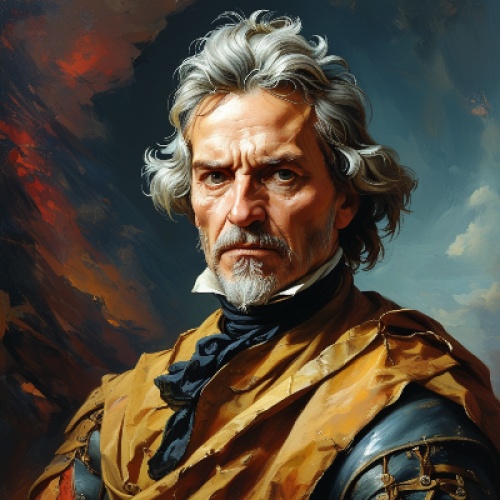The city of K?nigsberg was a place of relative peace, but the echoes of war and the deterioration of moral values were already beginning to take root in Europe. It was in this setting that a young Immanuel Kant, sitting in his modest study, first began to question the true nature of morality. Wars raged in the background, and the political landscape seemed ever-changing, driven by self-interest and corruption. Could there be a system of ethics that transcended political games and the violence of war? This question haunted Kant as the flames of conflict spread across Europe.
Kant, though small in stature and quiet in demeanor, was a giant in thought. He poured over ancient texts and modern philosophies, seeking an answer to the moral chaos he saw unfolding. Yet it was not until the Prussian government's increasing militarization that Kant felt the urgency of defending morality against the tides of war. The concept of duty, a principle that rose above personal gain, was beginning to crystallize in his mind.
Chapter 2: The Birth of the Categorical Imperative
As conflicts continued, Kant knew that a mere appeal to the religious or political systems of his time would not suffice to protect the moral order. These systems were too often manipulated by rulers and generals. In the quiet of his study, he conceived the idea of the Categorical Imperative - a law of morality that did not rely on divine commands or the whims of rulers but was universal and unconditional.
His work, Groundwork of the Metaphysics of Morals, was a manifesto for human freedom and responsibility. It argued that the moral law was not something imposed from outside but emerged from rationality itself. Each person, by virtue of being rational, was bound by the duty to act according to principles that could be universalized. This, Kant believed, was the only way to safeguard humanity from the barbarism of war and political manipulation.
Chapter 3: Defending Morality During the Napoleonic Wars
As Napoleon's armies swept through Europe, destroying old regimes and creating new ones, the moral crisis of the continent deepened. Kant was now an old man, but his commitment to defending the moral system had only grown stronger. His final works, including The Metaphysics of Morals, were an effort to solidify his ethical theory in a world on the brink of moral collapse.
Kant viewed the Napoleonic Wars not just as a political struggle but as a spiritual and moral one. The wars represented a clash between those who sought to impose their will by force and those who still believed in the dignity of human reason and freedom. He saw in Napoleon's conquest the ultimate threat to the autonomy of individuals - the idea that one man's ambition could justify the suffering and subjugation of millions. His writings became a moral weapon, urging people to resist the seduction of power and stand firm in their duty to one another.
Despite his age, Kant corresponded with political leaders, urging them to adopt a moral system based on respect for human dignity rather than sheer power. His voice was a lone one in the cacophony of war, but he never wavered.
Chapter 4: The Twilight of Reason
As Kant's health began to decline, Europe continued to be embroiled in wars that seemed endless. His body was frail, but his mind remained sharp, concerned not with his own legacy but with the future of human morality. Kant foresaw a world in which reason and moral autonomy would be threatened not just by war but by the rise of industrialization and materialism.
In his final days, Kant wrote his reflections on Perpetual Peace, a philosophical essay that would serve as his final defense of the moral system. He envisioned a world where nations, instead of going to war, would cooperate through reason and shared moral laws. His dream was not merely to end wars but to create a system where wars would become unnecessary - a global moral order built on the principles of human dignity and duty.
Chapter 5: The Legacy of a Moral Warrior
Kant's death marked the end of an era, but his influence only grew as the world continued to grapple with the moral questions he had raised. As Europe rebuilt itself after the Napoleonic Wars, Kant's moral philosophy became a cornerstone of political thought. His ideas about duty, respect for human autonomy, and the categorical imperative served as a bulwark against the rising tide of totalitarianism and moral relativism that would come in the centuries to follow.
Though the world never fully embraced Kant's vision of perpetual peace, his defense of the moral system stands as a testament to the power of reason in the face of war and moral decay. In an age when humanity's capacity for destruction threatened to outstrip its sense of justice, Kant's journey serves as a beacon, reminding us that the true fight is not for power or wealth but for the preservation of our moral integrity.
The Journey of Immanuel Kant chronicles a life spent in defense of a universal moral system - a life committed to resisting the forces of war, power, and moral deterioration.





